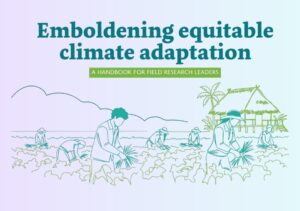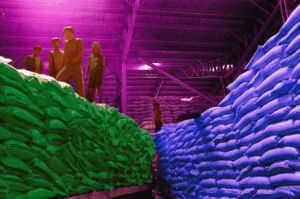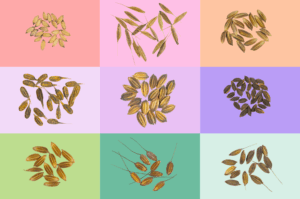
LOS BAÑOS, Philippines—Farm-trepreneurs, or farmers who can directly engage in global trade and value chains, are crucial in creating a thriving industry for heirloom rice, according to Dr. Digna Manzanilla, coproject leader of the Heirloom Rice Project (HRP).
“This will ensure that the benefits from value addition to the product will benefit most farmers who should be the main actors in the value chain,” says Manzanilla who is also the leader in attempting to link farmers in the Cordillera Region in northern Luzon to the value chain. “Farmer participation in the value chain will also help preserve the region’s cultural heritage.”
Heirloom rice is currently attracting the interest of numerous hotel and restaurant managers who are including the unique delicacy on their menus. Online food stores are also showing great interest in selling the distinctive rice product. The big challenge now is using science and partnership to enhance farmers’ business knowledge and skills.
The farmers stand to gain more economic benefits if they have the capacity to contribute to the setting up, organization, and management of their own businesses. These farmers are the direct beneficiaries of HRP, which is an initiative of the Philippine Department of Agriculture (DA) and the International Rice Research Institute (IRRI).
“It is important that the heirloom rice farmers do more than just produce their rice,” says Manzanilla. “It is essential that they have the ability to engage in the business end as well. They must know how to deal with the services of consolidators or other traders and to negotiate and achieve a competitive advantage as a collective body.”
Farmers in the provinces of Kalinga, Mountain Province, and Benguet have formed cooperatives in their bid to improve and capture the value of their heirloom rice by producing high-quality products that meet local and global demand, according to Manzanilla.

HRP has partnered with the Philippine Department of Trade and Industries (DTI), through the Bureau of Micro, Small, and Medium Enterprises Development, to build the capacities of the farmers’ cooperatives in maintaining viable and profitable businesses for their treasured heirloom rice varieties. This leads to the creation of true farm-trepreneurs. Farmers’ groups fall under the DTI micro enterprises that can contribute to gross value added; where the micro, small, and medium enterprises contribute 35.7% to gross value added.
On 8-9 August, 31 farmers representing their newly-formed cooperative in Kalinga and Mountain provinces attended a workshop, Entrepreneurial and negotiation skills development training for heirloom rice farmers in the Cordillera. The activity was coordinated by IRRI and DA-Cordillera Administrative Region with the DTI Regional Office in the region.
The next component of the training will be on 22-23 August for the farmers’ cooperatives in Benguet and Ifugao Provinces. The objective of this training is to enhance farmers’ local capacities to produce, process, and market their products using the value chain development approach adopted by the HRP.
“We cannot rest on our laurels by enhancing only the farmers’ productivity,” says Manzanilla. “If farmers are to truly benefit from research carried out in development projects, they need to have the ability to link their surplus production to both local and international markets. If they don’t, it will only be others in the value chain of this rapidly growing market who will take advantage of the huge opportunities. The farmers will lose a unique chance to significantly improve their livelihood.”
Myrna Pablo, DTI regional director, expressed her appreciation for the efforts of the DA and IRRI to link with their institution and program. ”This is one potent avenue for convergence of government programs in the Philippines to support our heirloom rice farmers,” Pablo said. “This is a soft-push to recognize the farmers’ contribution to social equity and inclusive growth. DTI is utilizing the Go Negosyo Act No. 10644 that is designed to bring government services closer to the small businesses through the establishment of small enterprises.”
The HRP is a results-for-development (R4D) model that is applying the concepts, principles, frameworks, and scope of market-based productivity. The project aims to apply these concepts to lead to the ultimate contribution of IRRI and DA in sustainable socioeconomic transformation among communities producing heirloom rice in the Cordillera.










